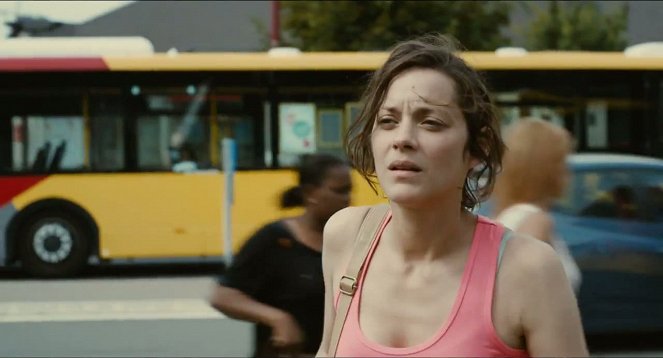Kamera:
Alain MarcoenBesetzung:
Marion Cotillard, Fabrizio Rongione, Catherine Salée, Pili Groyne, Olivier Gourmet, Christelle Cornil, Rania Mellouli, Alain Eloy, Simon Caudry (mehr)Streaming (3)
Inhalte(1)
Sandra kehrt nach längerem Krankenstand an ihren Arbeitsplatz zurück. Während ihrer Abwesenheit wurde ihr Job auf sechzehn Kollegen und Kolleginnen aufgeteilt, die dafür Prämienzahlungen erhalten haben. Jetzt wurden diese befragt, ob sie auf Sandra oder das Zusatzentgelt verzichten wollen. Mehrheitlich entschieden sie sich gegen Sandra. Ihr Ehemann Manu bestärkt sie, den Kampf aufzunehmen. Sandra hat nämlich ein Wochenende - zwei Tage und eine Nacht - Zeit, um ihre Kollegen und Kolleginnen doch noch umzustimmen. (ORF)
(mehr)Videos (3)
Kritiken (9)
"Warum zerbricht sie sich die ganze Zeit den Kopf, sie kann sich ja eine andere Arbeit suchen“, denkt man die ganze Zeit. Es sieht so aus, dass wegen der Hauptfigur zu viel Drama gemacht wird. Dann versteht man, dass es nicht so sehr um die Arbeit ging, sondern um… Und so wird aus dem Film eine hochwertige soziologische Studie von einer schwierigen Lebenssituation eines sterblichen Menschen. Cotillard ist ausgezeichnet.
()
Belgischer sozialer Realismus? Nichts für mich. So etwas Manipulatives habe ich lange nicht gesehen. Die Dardennes haben auf ihrer Suche nach Erfahrung nicht einmal bemerkt, dass sie einen Selbstmordversuch nicht einfach mit einer Magenspülung abtun und dieses Kapitel abschließen können. Ein falsches, naives und ich möchte sogar sagen dummes Werk. Es versucht scheinbar Interesse und Emotionen zu wecken, die Festivalzuschauer sind begeistert, manche nur deshalb, weil sie glauben, dass die Wahrheit durch die schmutzige Marion Cotillard repräsentiert wird (in sinnloser Logik spielt eine Schauspielerin mit gekämmten Haaren nicht die Wahrheit und umgekehrt).
()
Es ist der wohl am stärksten strukturierte Film des Dardenneduos, bei dem es im Wesentlichen um einen sozialer Thriller schlechthin geht: die Hauptheldin hat eine klar definierte und definierte Aufgabe (9 Mitarbeiter davon zu überzeugen, nicht auf ihren Boni zu beharren und damit ihren Job zu erhalten), ein Zeitlimit und Gegner (Meister Jean-Marc, der angeblich per Telefon Einfluss auf die Kollegen nimmt). Die Dardenne-Bewegungsdynamik wurde auf die Ebene eines komplexen Genre-Motors erhoben, welcher den Film schlussendlich zu einer absolut genialen Doppelwende führt. Ich werde mich wohl wiederholen, aber warum denn auch nicht. Niemand dreht heutzutage Filme so, damit sie in ihrer Einfachheit die Komplexität der jetzigen Welt, moralisch, persönlich und wirtschaftlich gesehen, perfekt widerspiegeln können. Niemand kann Situationen so aufbauen, damit der Betrachter in völlige Unsicherheit verfällt und jeglichen Anzeichen von Manipulation einem intensiven emotionalen Terror ausgesetzt wird. Es gibt schon Filmemacher im Genre des sozialen Dramas, welche dem Dardenne-Duo nahekommen, jedoch das Original ist unübertroffen. Ein prätentiöses Denkmal der menschlichen Hartnäckigkeit, Würde, Marion Cotillard sowie ein dringliches Zeugnis über den Zustand, in dem sich die heutige Gesellschaft befindet. Film leben eben. Und ohne ein einziges Anzeichen von Pathos. Außer desjenigen Pathos, welches das ganze in Form von eher weniger witzigen Bemühungen hervorruft, irgendeine Umschreibung durchzuführen.
()
Tramtadada, endlich hat mich ein Film, der dieses Jahr eine Oscar-Nominierung erhalten hat, in die Knie gezwungen. Und natürlich stammt dieser aus einer belgisch-französischen Produktion. Zwei Tage, eine Nacht ist um Längen besser als die amerikanischen Eisen im Feuer. Was das Kriterium irgendwelcher Werte, des Realen und einer "Geschichte aus dem Leben“ betrifft, so gewinnt Zwei Tage, eine Nacht auf der ganzen Linie. Das, was Sandra passiert ist, kann jedem von uns passieren, jederzeit, niemand ist unbesiegbar, unantastbar und unsterblich. Und in solchen Momenten zeigen sich Werte wie Solidarität, Freundschaft, Kollegialität und Mitgefühl. Marion ist in ihrer Rolle unglaublich glaubhaft, sensibel, sie bestätigt tatsächlich, dass sie eine Schauspielerin par excellence ist. Ich werde nun die Werke der Brüder Jean-Pierre und Luc näher studieren, ich glaube, dass auch ihre weiteren Filme mein Herz anrühren werden. Im Geiste denke ich darüber nach, wie meine Kollegen abstimmen würden, wenn ich in eine ähnliche Situation kommen würde. Nichts ist verdammt noch mal klar und einfach.
()
After 12 Angry Men come 16 dissatisfied men and women. They are stuck in their unsatisfying jobs, which makes them easy to manipulate. They might not even be aware of their dependent position in the capitalist system if Sandra had not approached them with her request. The main dilemma that they are faced with is whether to conform and vote with the majority or to weigh their decision and possibly take on greater responsibility. While the indecisive co-workers have to struggle a bit with their own morals, Sandra fights for her lost self-respect, family stability and faith in her own existence. She would most like to not be seen or heard. She would most like to simply not be. Her self-confidence has fallen to less than zero. Marion Cotillard expresses the character’s feelings of shame and resignation through timid gestures, a hunched posture, a blank expression on her face without makeup and excessive gratitude for every display of humanity. ___ The long shots/sequences that comprise each of the encounters enable her to portray a change of mood from apathetic sadness to cautious joy, from resignation to determination in one go and without losing contact with the setting (which in the Dardenne brothers’ films conditions the behaviour and positioning of the characters). Mainly thanks to her family, she slowly realises that regular doses of Xanax and self-denial are not the only way out. One of the things that makes this apparent to her is the slowly waning interpersonal solidarity. It evidently makes Sandra happy if she can share something with her loved ones, such as a song (sung together in the car) or food (the film begins with taking a cake out of the oven; her husband works as a cook). ___ The brief moments of happiness liven up the intentionally and repetitively stultifying narrative structure. However, the repetition of the same types of situations does not diminish the film’s dramatic potential. We can count down the remaining time and how many people are left to visit, and after the pattern is established, we are kept in anticipation of how the next co-worker that Sandra approaches will respond to her request, and whether it will be a man, a woman, a white person, a black person, a younger person or an older person. The social and ethnic diversity of the supporting characters, none of which is a one-dimensional stereotype, and the effort to take the motivations for their decisions into account and their various responses are indicative of the filmmakers’ empathy, as they do not judge or simplify, and they do not handle the characters as if they were inanimate tools to further the narrative (you have the feeling that the characters exist even outside of the space staked out for them in the film). ___ The setting of a deadline and the structuring of the narrative into brief segments takes Two Days, One Night out of the realm of documentary-style verism that is characteristic of some of the Dardennes’ earlier films, but the strong humanistic message has not been weakened in any way by the more elaborate structure of the plot. Furthermore, the development of the drama never seems overly forced, thanks to the smooth incorporation of more conventional narrative elements (a suicide attempt, leaving an abusive husband) into the flow of the action and the consistent consideration of socioeconomic determinants. ___ Thanks to the clear structure akin to that of a folk ballad (but without a clear ending) in which the protagonist faces a difficult test, the Dardennes were able to emphasise the allegorical subtext and timelessness of the drama, which is outwardly tied to a specific situation and setting. With its apt metaphor for the capitalist system (the workers are at each other’s throats while the boss skates), the film doesn’t slip into didacticism while presenting us with the same questions that Sandra indirectly challenges her co-workers to ask. Would we put our comfortable membership in the majority over our own inner ethical convictions? Would we sacrifice ourselves for a person with whom we have almost nothing in common except our social status? These are questions that I am afraid to answer. 80%
()
(weniger)
(mehr)



Werbung